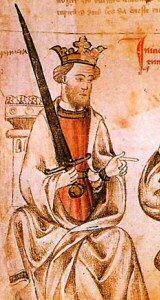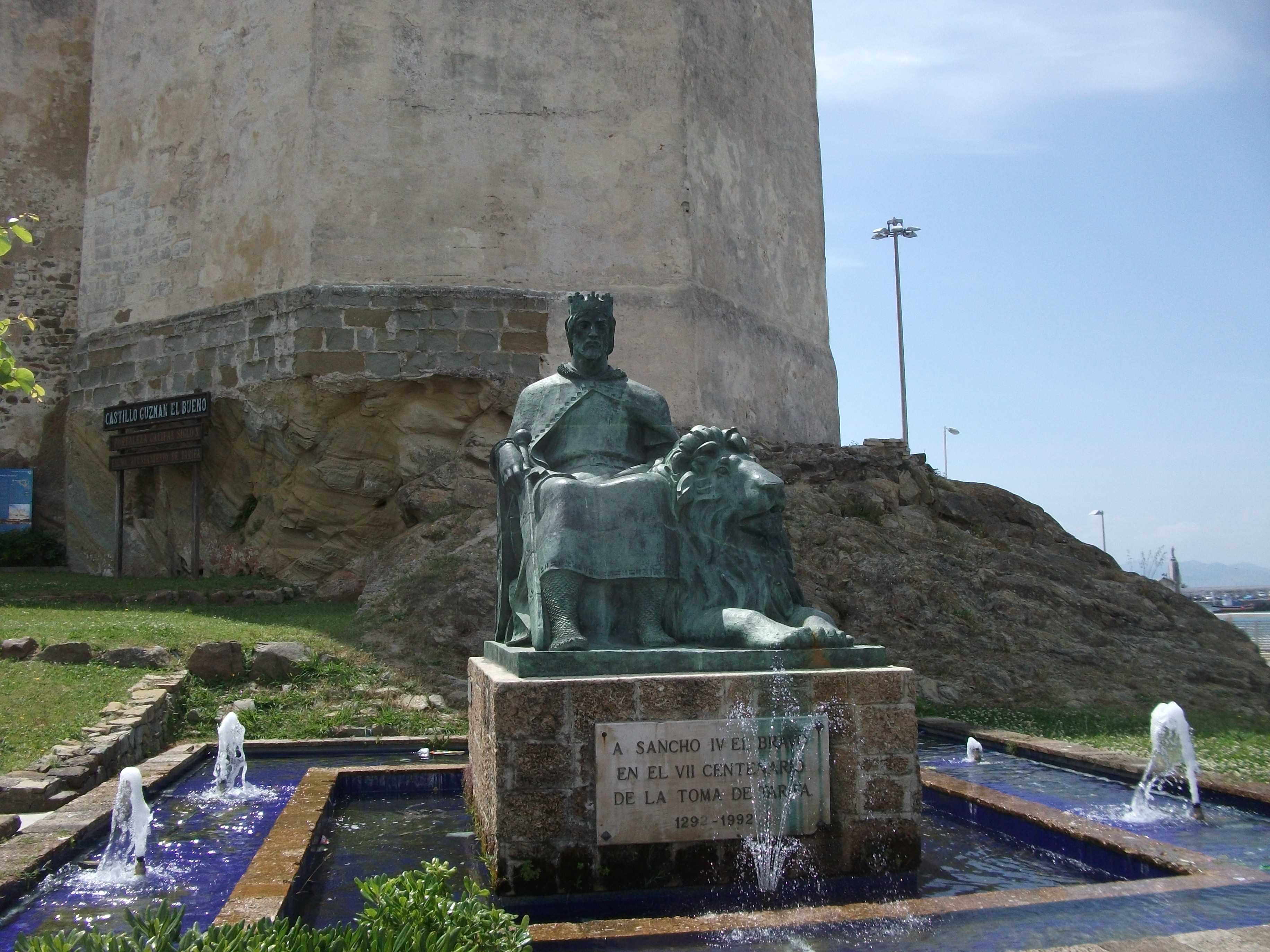The Castilian army retreated north from the Battle of Algeciras with its tail between its legs. The nobles were demoralised and angry. When he realised that his sons were angered by his wish to have his grandson take the throne, King Alfonso made the huge mistake of going behind their backs and petitioning the pope to ratify his decision. His sons were furious.
The family that King Alfonso X once had was in tatters. Queen Violante took their grandsons away to her brother’s kingdom of Aragon, and Sancho was rallying the disaffected nobles around him. His younger brother, John, had split the vote, and was petitioning another group of nobles to follow him and had allied himself with Lope Díaz III de Haro, one of the powerful disgruntled nobles critical of King Alfonso’s policies. The church had also suffered from Alfonso’s taxes and by 1282 Sancho and his mother, Violante, had obtained the support of the clergy and enough of the noble families to make his move.
 King Sancho
King Sancho
He travelled to Córdoba on the pretext of discussing the treaties with Emir Muhammad II, but in truth, he arranged a deal whereby the Emir of Granada would leave him alone whilst he fought his father for the crown. With his rear secured, Sancho began to gather his strength for the civil war to come.
Desperate and destitute, King Alfonso sent a message to his arch-enemy, Abu Yusef, offering land and booty if he would help him regain his crown by joining forces and attacking his son’s base in Cordoba. Not surprisingly, Abu agreed. An invitation to invade a demoralised and divided Castile was too much to resist. The two armies met at Sahara de los Atunes and marched inland, and King Alfonso sent emissaries to Sancho offering surrender terms. Abu, fearing raids on the Magreb by the Nazrid emir, took the port of Málaga as a preamble to the battles to come, thus securing his rear.
For a while, many of the nobles supporting Sancho wavered. They had backed a renegade, and were trapped between a hostile coalition of Marinids and Christians and the Caliphate of Granada; any one might renege on all deals if the war looked promising for them. The coalition lasted weeks before the two armies were at odds with each other. Christians who had hated and fought Moors for centuries were marching alongside them, and worse, Abu Yusef was in command of them all.
By mutual consent, the two armies separated at Córdoba, and the Christians attacked alone. The battle resulted in the beheading of the mayor of Córdoba and the killing of the mayor of Seville, who was fighting for the king. Meanwhile, Sancho was in Salamanca and as defiant as ever. The whole campaign had been a waste of money and time. Both armies stood down and acknowledged an expensive stalemate.
Abu led his army back to Morocco, but by allying himself with the Moors, Alfonso had alienated himself from much of Christendom. He still had some followers who preferred having his grandson as king, and he retreated to Seville which had always been loyal to him. He lived there in the Alcazar for the remainder of his life. By 1283, the three factions were warily watching each other and waiting for Alfonso to die.
Almost blind, with a cancer in his left eye which had forced the eyeball out its socket, his legs swollen and numb with dropsy, Alfonso was still a king in his own castle, and though he knew he could not expect to live much longer, he spent his time playing board games and involving himself in new works of culture. He sent messages to both his sons promising gifts of land and title, but to no avail, Sancho wanted the crown, and nothing else would suffice. In a final act of desperation he asked the Bishop of Cádiz and the Archbishop of Seville, his only allies in the church, to petition the pope to have Sancho excommunicated, thus preventing him becoming king. The pope duly gave the old king what he desired, a papal gift that also rendered Sancho’s children illegitimate and therefore also ineligible for the crown.
This is where Sancho showed his true mettle. He cared nothing for the church, and when his father died in 1284, he was crowned King of Castile and León in Toledo by his followers. He immediately began a purge of his enemies. He cornered Lope Díaz III de Haro, the lord of Biscay, near Badajoz and had him executed. Other nobles had allied with Lope, and Sancho ordered the execution of them and 4,000 of their followers at Talavera. One of the supporters of Ferdinand de la Cerda hid in the poor town of Ávila, which was a Cerda stronghold. They would not give him up, so Sancho ordered the whole town murdered. Sancho’s brother, John, he threw into prison for being a co-conspirator with Lope. With many of his enemies dead, Sancho now had good chance of keeping the crown.
Whilst Castile had been in turmoil, Abu Yusef Yusuf had to spend much of 1284 putting down a Maqil rebellion in the Draa valley. In Granada, the Banu Ashqilula, under a renewed Nasrid assault, had again appealed to the Marinids for help. Abu had been watching the rise of Sancho, and he preferred King Alfonso’s grandson as king; he knew Sancho was going to be a formidable enemy . Sensing an opportunity to capitalise on Granada and Castile’s weakness, in 1285 he mounted another expedition across the straits. As before, he landed his army at Tarifa and swept north to devastate a broad area from Medina Sidonia to Carmona, Ecija and Seville. Nervous at Seville's disposition (a Cerda party stronghold), Sancho IV assembled his army there, and dispatched the Castilian fleet, some hundred ships under his Genoese admiral Benedetto Zaccaria, to blockade the mouth of the Guadalquivir, and prevent the Marinid navy from assaulting Seville upriver. Abu was close to laying siege to Jerez by August 1285, but Sancho marched the Castilian army south to stop him. Abu decided not to engage Sancho at Jerez. He withdrew his army and haughtily asked to open negotiations with the king, thinking that the Christians were bankrupt and could not sustain another war. Abu had seriously underestimated Sancho, who spurned his offer to negotiate and drove him back to Algeciras. Legend has it that Sancho´s return message offered Abu a carrot, and if he did not accept the carrot, he would show him the stick.
That October in 1285, Sancho IV of Castile secured a five-year truce and treaty with the Marinid emir Abu Yusuf. In return Abu promised not to intervene in Castile for the Cerda party, and the Marinids received equal assurance that there would be no more Castilian attacks on Muslim territories in Spain. To seal the deal, Sancho IV agreed to hand over to the Marinids the collection of Arabic books that had been seized from Andalusian libraries by Church authorities during the Reconquista, in return for Marinid payment of 2,500,000 maravadís cash compensation for the Castilian property taken and damaged by the Moroccan armies.
In March, 1286, Abu Yusuf also began negotiating a final settlement with the Granadan ruler Muhammad II. The Nazrids agreed to recognize Marinid possession of Tarifa, Algeciras, Ronda and Guadix, in return for which the Marinids agreed to surrender all other possessions in Iberia. The remnants of the Banu Ashqilula family would be exiled to Morocco, and the Marinids would guarantee they would cease all intrigues against the Nasrid rulers.
Th Moroccan emir was in the middle of these negotiations, when he fell ill and died on 21 March 1286 in Algeciras. Abu Yusuf's remains were translated to the Marinid necropolis at Chellah, where he had built a tomb. The new emir, Abu Yaqub Yusuf had no sooner taken his father’s title than he suffered and attempted coup from his own son, backed by the ever persistent rulers of Tlemcen. He survived, but he would be locked in a relentless war with his neighbours in the Maghreb until the end of his life.
Abu Yaqub Yusuf entered the negotiations in place of his father, but his stance was more along the lines of forming an alliance with the Nasrid emir to fight the Christian kings. Muhammad II sent envoys to Sancho with a plea to join the alliance and prevent another war. Sancho’s reply was that he would make an agreement with Muhammad, but that Abu’s son was untrustworthy and was still planning on making war. Sancho was right. In the harbour at Tangier, Abu Yaqub was gathering invasion barges from all over the Mediterranean. Sancho knew that he would use Algeciras or Tarifa to land his army, and so his arrangement with the Granadan emir was to unite forces and take the two ports from the Marinids.
 The statue of Sancho IV in Tarifa.
The statue of Sancho IV in Tarifa.
By 1292 Sancho had Tarifa and Algeciras under siege. Abu Yaqub was almost ready to invade. He had 12,000 men camped on the beach, and he brought the invasion barges out of the harbour and moored them ready for the troops to embark. Muhammad had bolstered Sancho’s navy with his ships, and they patrolled the straits together. Early in the morning on the day that Abu’s fleet was to sail, the Castilian navy appeared on the horizon, and Abu was helpless to prevent them boarding and burning his invasion barges. The troops on the beach could only scream abuse at the Christians as they departed. Within weeks, the port of Tarifa fell to Sancho’s army, but Algeciras remained a Marinid held fortress. There was one more Marinid invasion to come, and it would produce one of Spain´s greatest heroes.